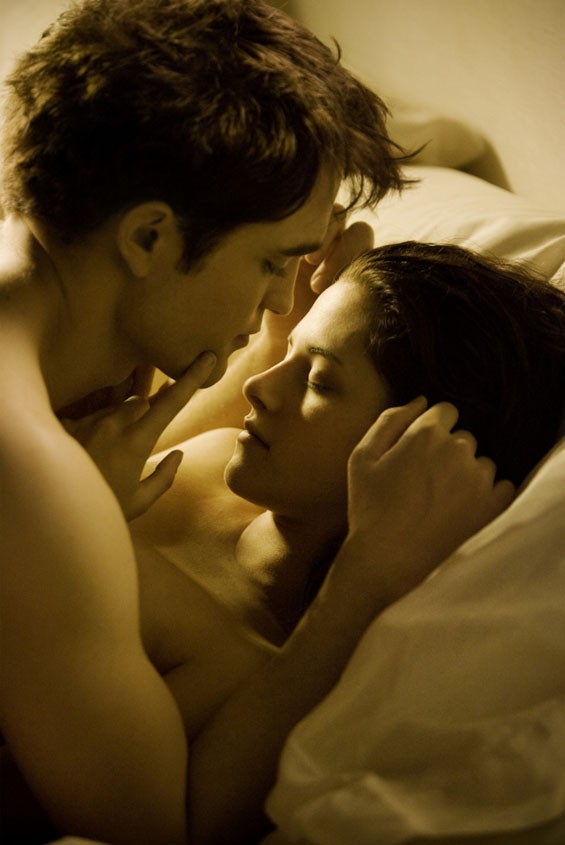The single advantage the awful Twilight movies have over Stephenie Meyer's awful-but-gripping novels is that, unlike the books' sad sack, movie Bella Swan is a spiky, populist heroine. On film, Kristen Stewart beautifully underplays (or, for all I know, overplays to the absolute peak of her abilities) Bella's deadpan ordinariness, rubbing uncomfortably against the physical perfection and remote coolness of the Cullen vampire clan. There's real interest in seeing that slightly morose, slightly angry young woman interact with the sparkling mannequins around her.
Unfortunately, in Bill Condon's Breaking Dawn–Part 1, Bella gets turned. That's not to say she becomes a vampire, necessarily — though you might recall that in the previous Twilight film, Eclipse, she pursued undeath with steely determination — but that in marrying Edward Cullen (Robert Pattinson), she becomes truly one of them. Maybe it was the enormous wedding with benches carved from tree trunks, or the private jet, or the villa on the Cullens' Brazilian island. When the local housekeepers gawked at Bella lounging on an immaculate leather sofa, I thought, well, shit, Bella Swan's no longer one of us. She has joined the vampires in the 1 percent.
Yes, Bella and Edward marry in Breaking Dawn–Part 1. And they do it. And Bella gets pregnant with some kind of Miracle-Gro demon spawn that breaks her ribs from the inside. That's just the beginning of the shit show that is Condon's film, barely adapted by Melissa Rosenberg from the first half of the last book of Meyer's series. Condon delivers the most authoritatively directed Twilight film so far, which only brings into sharp relief how tonally incoherent its story is. In 117 minutes Breaking Dawn lurches from erotic awakening to sex farce to body horror — three genres, Condon seems to have discovered, not made for PG-13. Coming off worst is the film's climax, a bloody, gruesome sequence that begged the question of how it might be filmed from the instant Meyer wrote it. The answer: teasingly, clumsily, and not nearly bloodily gruesome enough.
First, though, there's the debate between Bella and most of the Cullens about whether to get rid of what's growing inside of her. Expect much to be written about this, and for op-ed hacks on either side of the debate to squeeze Breaking Dawn for all it's worth; the film's actual politics are muddy. Bella, who's willing to have the baby even though it'll certainly kill her, could best be described as anti–life, while the vampires trying to strong-arm her might be pro–abortion, but they're pretty determinedly anti–choice. ("Carlisle will know how to get that thing out of you," Edward growls.) Suffering from some kind of hellish preeclampsia — her body, it's explained, is rejecting the fetus — an increasingly cadaverous Bella stares listlessly at the X-rays and ultrasounds, which, in the film's most affecting visual, reveal an empty black hole where the baby should be.
Breaking Dawn's plot points — and there are only four in total — are separated by long montages and music-video sequences. The padding is at its most brutally obvious when we're treated to a long sequence, covered by three separate cameras, of Jacob (Taylor Lautner) walking up a staircase, turning at the landing, walking up another staircase, turning at the landing, and walking up a third and final staircase. Yet whole characters and subplots are shoved to the side, never to be seen again; I'm almost certain that one vampire played by Jackson Rathbone utters but a single word. ("Possibly.") Breaking Dawn is both overlong and understuffed. I lived a thousand lifetimes watching it, and died a thousand deaths. (The worst one was when Edward looked up "immortalicum" on Yahoo! search. On Yahoo! search!)
For the teens of all ages who are Twilight's true audience, the movie will serve, I'm sure. For parents — dragged willingly or unwillingly into the theater to be buffeted by screams and sighs and hormones buzzing like a power line — the real horror of Breaking Dawn–Part 1 comes as we see Bella's parents (played warmly by Sarah Clarke and Billy Burke) watch their girl disappear. They seem to know that the Cullens are no average in-laws and that once Bella becomes part of that family, she'll cease — in a way that parents fear, deep inside, will be the case but rarely, in real life, is — to be a part of her own. Burke's expression during the wedding is that of a man passing a stone, and I teared up a bit for the first time ever in a Twilight film when, walking down the aisle, Bella asked him not to let her fall, and he replied, "Never."
When Bella and Edward kiss at the altar, you'll hear applause in your theater but not, at first, in the film. Condon 360s the camera around the newly married couple to reveal their own private world: friends and family gone, those artisanal benches empty, covered in vines. I can't be the only father of daughters who saw that and felt, for a moment, a stab of sorrow — that one day I'll be gone from my daughters' lives, and also that before that happens, I'll probably have to watch this fucking movie again.


